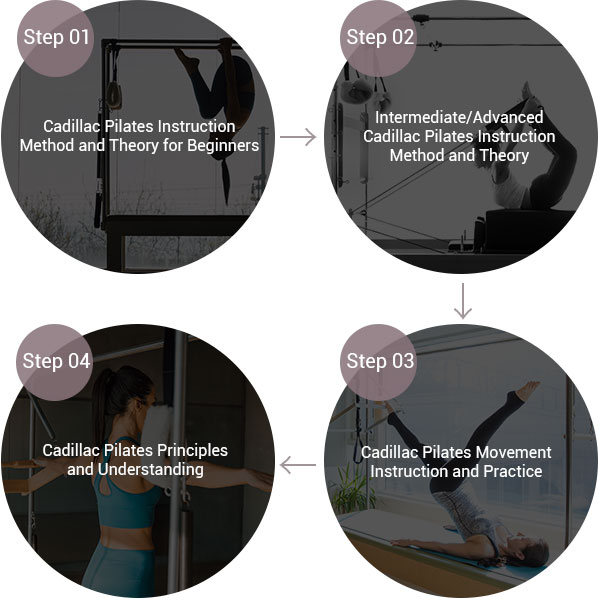Cadillac
As a device that can induce the most diverse movement postures among Pilates equipment, students learn how to teach exercises such as Standing, Kneeling, Supine, Prone, Hanging, Side-lying, and Sitting. It improves professionalism as a Pilates instructor by providing instructions on how to use auxiliary devices including Push-thru Bar, Roll-Down Bar, Fuzzy, and Trapeze, how to set up the device according to body type and strength level, and a guide for safety and injury prevention.
Course information

Course overview
Cadillac Curriculum
| round 1 | Improves the control ability of the core muscles that segment the spine by responding to the resistance of the spring, such as Roll down, Airplane Prep, and Breathing. |
|---|---|
| round 2 | Learn how to exercise with the scapula stabilized through Lat Pull, Scapula Isolation, and Pull Down, and learn spinal movement based on core strength through Teaser Prep, Swan Dive, and Cat Prep. |
| round 3 | Improved muscle strength to control shoulder joint movement based on core stability such as Biceps Curls, Midback Series, Chest Expansion, and Side Arm Work |
| round 4 | Based on pelvic stability, such as Bend & Stretch, Circles, Waking, Lift & Lower, learn movements to maintain the correct alignment of the lower extremities and strengthen the surrounding muscles. |
| round 5 | Summary of learning contents, practical teaching, sequence composition, demonstration and test. |
Education target
- Those who are new to Pilates
- Those who want to fulfill their dream of becoming a Pilates instructor
- Physical education majors and physical/occupational therapy majors who want to apply to exercise therapy
Test standard
- Pilates Principles and Understanding
- Understanding the sequence and method of exercise
- Setting goals for exercise according to purpose
- Teaching skills including movement correction, hands-on, and image cueing
- Instructional ability to use appropriate props tailored to the characteristics
| practical skills | theory | 10 questions (Explanation/teaching of exercise method, goal) |
10 questions (subjective/ multiple choice) |
|---|



 LOGIN
LOGIN JOIN US
JOIN US

